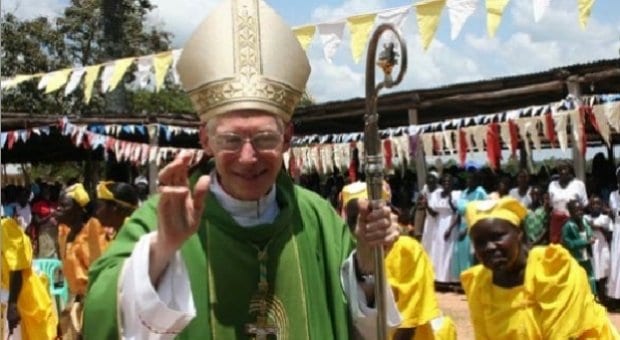In response to an email expressing alarm at the Ugandan parliament’s passage of an anti-gay bill, the Vatican’s representative in Uganda says lawmakers’ approval of the measure caught him and the country’s Catholic bishops off-guard, according to New Ways Ministry, an LGBT-friendly Catholic group.
“It was only this morning that I found out about the action of the Parliament,” Papal Nuncio Michael Blume writes Dec 21, the day after lawmakers approved the bill. “In fact the whole business caught many of us, including the bishops’ conference, by surprise as there had been no hints of it in the press nor on the site of the Parliament, which indicates legislation being discussed. The bill had been put on hold last February and seemed forgotten, but . . . ,” Blume writes, without finishing the thought, but pointing to coverage of the issue in the country’s media.
In a vague statement, Blume, who was appointed to the Apostolic Nunciature in Uganda by Pope Benedict XVI in February 2013, may have expressed hope that Museveni will not sign the measure into law.
“The bill will die if the President does not sign it within thirty days. We pray the Holy Spirit to give him wisdom,” Blume writes in his reply to Brian McLauchlin of Divine Word Missionaries. Blume also notes the Ugandan prime minister’s concerns about consultation over the bill and the question of quorum that arose prior to its passage.
Prime Minister Amama Mbabazi had indicated that he didn’t know that the measure was up for debate, a parliamentary report reveals. He had apparently sought — unsuccessfully — to have its consideration deferred, noting that the government was in unspecified “negotiations” over the measure and that a quorum was needed to pass it.
McLauchlin wrote to Blume asking him to use his influence to press the African country’s bishops to speak out against the bill.
“I am gravely concerned that a number of human rights violations will occur if the President signs this bill,” McLauchlin states. “Although the Catholic Hierarchy may not approve of same-sex relationships or a homosexual lifestyle, I believe the Hierarchy would agree that everyone has the right to be treated with dignity and respect. Imprisoning someone for life would clearly constitute an abuse of his/her rights,” McLauchlin says in his correspondence with Blume, which New Ways Ministry made public.
“It’s the general policy for nuncios to work together with the bishops conferences on questions of national interest,” Blume replies. “For that reason I was already in contact with the Secretary General this morning . . . I’m sure there will be a lot of movement between the bishops’ conference and various institutions of the country.
Blume’s message to McLauchlin also refers to previous communication about the 2009 version of the bill, when it still included the death penalty.
“The introduction of the death penalty and imprisonment for homosexual acts targets people rather than seeking to counsel and to reach out in compassion to those who need conversion, repentance, support, and hope.”
The revised version provides for a 14-year prison term for a first conviction and life imprisonment for the offence of “aggravated homosexuality.” It also criminalizes “promotion” of homosexuality, while those who fail to report homosexual activities to the police face prison sentences.
New Ways Ministry’s Francis deBernardo says that since it’s unclear what the Ugandan bishops’ current stance is regarding the bill, “it’s important that the pope and the papal nuncio hear from Catholics that they want church teaching on human dignity and respect to be upheld in this matter.”
In response to a call from the head of Uganda’s Pentecostal churches to sign off on the bill, President Museveni has indicated he will review the measure before acting on it, New Vision reports.
According to the report, Museveni, who made the remarks at Christmas prayers, said he would assent to the bill if he agreed with it or send it back to parliament if he was not satisfied with its content.
Since the bill’s passage, activists and human rights groups have called on Museveni to reject it.


 Why you can trust Xtra
Why you can trust Xtra


